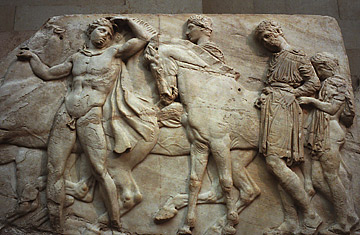
The Elgin Marbles receive their name from the British lord who craftily spirited them away from Greece. Thomas Bruce, the 7th Earl of Elgin and ambassador to the Ottoman Empire — occupiers of Greece in the early 19th century — grew to admire the Parthenon's extensive collection of ancient marble sculptures and began extracting and expatriating them to Britain in 1801. Lord Elgin claimed his imprimatur from an Ottoman sultan, who said he could remove anything from the Parthenon that did not interfere with the ancient citadel's walls. Despite objections that Lord Elgin had "ruined Athens" by the time his work was done in 1805, the British Government purchased the marbles from him in 1816. They've been housed at the British Museum ever since.
Current Status: Greece considers Lord Elgin's agreement with the Ottomans dubious at best. They claim the Sultan was bribed and that, as an occupier, he really had no authority over the Parthenon to begin with. Calls to return the Elgin Marbles to Greece have fallen on deaf ears; the British argue that giving the marbles back would do everything from irreparably destroying them to creating more demand for the return of ancient art, draining the collections of European museums.